pinupmd.xyz – Hi, Gadget Friends! In today’s world of technology, the battle between the two largest mobile operating systems, Android and iOS, has become an ever-hot topic for debate. Each platform has its own advantages and disadvantages, so the question always arises, “Which is the best?” Before we dive in, keep in mind that there are no absolute answers to this comparison. Each user’s preferences, needs, and lifestyle will influence the most appropriate choice. However, let’s explore in more detail what the advantages and disadvantages of Android and iOS are.

Ecosystems: Freedom and Security
One of the main aspects that differentiates Android and iOS is the ecosystem they offer. Android, developed by Google, offers incredible freedom and openness. Users can easily modify their devices, install applications from various sources, and enjoy various device options from various manufacturers.
On the other hand, iOS, which is owned and developed by Apple, offers a more closed and controlled ecosystem. These systems are more secure and integrated, but also more limited in terms of modification and flexibility. Apps can only be installed from Apple’s official App Store, and iOS devices are only manufactured by Apple itself.
User Interface and Experience
When it comes to user interface and experience, Android and iOS have different approaches. Android is known for its more customizable and diverse interface, as each device manufacturer can modify the appearance and features according to their preferences. This provides a wider choice for users, but can also reduce the consistency of the experience across devices.
In contrast, iOS is known for its cleaner, intuitive, and consistent interface across all Apple devices. The system is designed to provide a smooth and seamless experience, although the customization offered is more limited.
Security and Privacy
Security and privacy are important aspects that are often considered when choosing a mobile operating system. Apple is known to have a stricter approach when it comes to security and privacy of user data. The strict vetting process for apps entering the App Store, as well as strict encryption and control over user data, makes iOS considered more secure by many users.
However, this does not mean Android is unsafe. Google continues to improve Android security with regular updates and new security features. However, Android’s open nature also makes it more vulnerable to malware attacks and malicious apps if users are not careful about installing apps from untrusted sources.
Apps and App Stores
Both Android and iOS have their own app stores that offer thousands of apps for various purposes. Google Play Store for Android and App Store for iOS are the two largest app stores in the world.
Google Play Store has an advantage in terms of the number of apps available, especially for free apps. However, Apple’s App Store is known to have better and more consistent application quality due to its strict selection process.
Accessibility and Price
One of Android’s main advantages is its accessibility and wider range of device prices. With so many manufacturers offering Android devices, users can find a choice of devices to suit their budget, from affordable to premium devices.
In contrast, iOS devices are only produced by Apple, and usually have a higher price compared to Android devices with similar specifications. However, many users consider this higher price to be an investment worth the quality and experience offered by Apple devices.
Software Support and Updates
When it comes to software support and updates, Apple has a significant advantage over Android. Apple is known for providing longer software support for their devices, with operating system updates available over several years.
Meanwhile, Android operating system updates often depend on device manufacturers and mobile carriers, so not all Android devices receive the latest updates quickly or at all.
Accessories and Other Ecosystems
Both Android and iOS have a wide ecosystem of supporting accessories and devices. Apple has the advantage when it comes to better integration between their devices, such as the iPhone, iPad, Apple Watch, and MacBook. Users can enjoy a more seamless and unified experience when using multiple Apple devices at once.
Closing
Ultimately, the choice between Android and iOS really depends on each individual’s preferences and needs. Android offers freedom, customization, and a wider variety of prices, while iOS provides security, privacy, and a more consistent and unified user experience.
For those who want greater freedom and customization, as well as a more affordable device, Android may be a better choice.